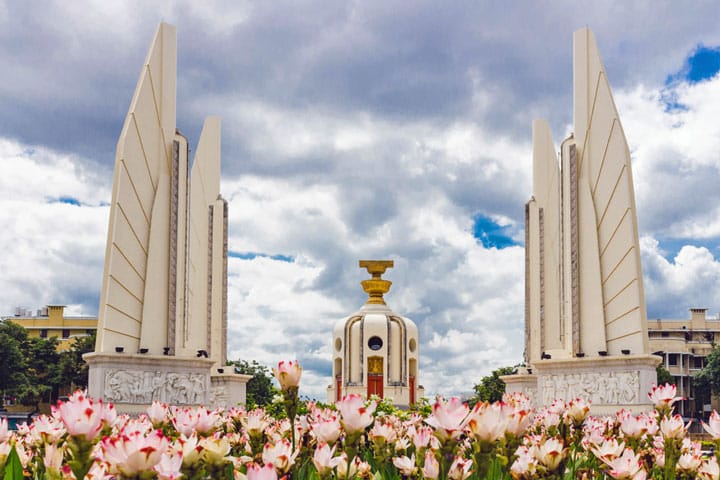December 10 – Constitution Day
Tomorrow is a national holiday in Thailand: Constitution Day. Many Thais are free on this day, especially civil servants, to reflect on the constitution and democracy. The significance of this day goes back to 1932, a year of great changes in Siam that resulted in the end of absolute monarchy.
At the time, the Siamese economy was suffering from the effects of the Great Depression and King Prajadhipok (Rama VII), was seen by some as too young and inexperienced to deal with the country's various problems. In June 1932, a coup followed, without violence, by a group of intellectuals and military known as the People's Party. The king was given an ultimatum and had to approve a provisional constitution. Despite an initial refusal, the king signed the constitution, ending absolute monarchy in Siam.
Internal disputes between the People's Party and opposition controlled from the Palace resulted in a new and revised permanent constitution signed on December 10, 1932 by King Rama VII. The monarchy was no longer allowed to interfere in the administration of the country and became a constitutional monarchy. The royal house was declared sacred and inviolable.
Since 1932, Thailand has undergone numerous coups and political changes, often involving amendments to the constitution. Nevertheless, every constitution assigns a special role to the monarchy, with the king as head of state, in charge of the armed forces and seen as the advocate of all religions.



any constitution? Only since that of 1957 (?) is the special status with king as head of state described. But under royalist influence/propaganda they pull this all the way back to 1932. I'd have to look up the details. But the powers that be see the written constitution as something Western, that Thailand had unofficially had some kind of constitution for centuries under the leadership of their special, paternal, paternalistic monarchs.
It could also be only since 1978 that the Constitution of Thailand has referred to “a democratic regime of government with the king as head of state.” Should I dig into the books at home? The point is that the first constitution of 1932 really turned things upside down with clear European influence (Pridi and Phibun, among others, had received their education in France). The former king could not stomach this and wrote 'draft' on the first constitution before his signature. In the first real constitution there were already concessions to the royalist powers. But the people of the old regime were still struggling with the loss of power, and in June 1933 there were even plans to have the founders of the coup and the new constitution beheaded. The head of Pridi, among others, would then stand on a stick outside the grand palace, according to old-fashioned custom.
There has actually been a constant struggle to restore the power of the highest regime, the revolution of 1932 was too Western, did not fit Thailand where a fatherly leader listened to the people and decided for himself what was right and who sometimes had to punish harshly but lovingly . Little by little we see democratic principles being lost in new constitutions. Like a kind of rag, which isn't that important anyway. Elsewhere too we see a retroactive dilution of what the 1932 revolution stood for. I wonder what the leaders of the 1932 coup would think if they saw what the country has become.
- https://link.springer.com/chapter/10.1007/978-981-13-2859-6_13
- https://link.springer.com/chapter/10.1007/978-981-13-2859-6_13
The Democracy Monument on the Rachadamnoen ('Royal Road') has become virtually inaccessible due to fences and gardens, as can also be seen in the image above. Moreover, there is now also a text placed in the middle that says ทรงพระเจริญ song phra charoen which means 'Long Live the King'.
Many memories of that day in 1932 have since been deleted, read:
https://www.thailandblog.nl/achtergrond/mysterie-verdwenen-gedenkplaatje-revolutie-1932/